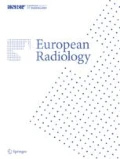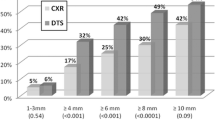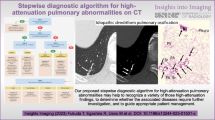Abstract
The purpose of this study was to find out if the use of 1.25-mm collimated thin-slice technique helps to detect more small pulmonary lung nodules than the use of 5 mm. A total of 100 patient examinations that allowed a reconstruction of 1.25-mm slice thickness in addition to the standard of 5-mm slices were included in a prospective study. Acquisition technique included four rows of 1-mm slices. Two sets of contiguous images were reconstructed and compared with 1.25- and 5-mm slice thickness, respectively. Two radiologists performed a film-based analysis of the images. The size and the confidence of the seen nodules were reported. We did not perform a histological verification, according to the normal clinical procedure, although it would be optimal regarding research. Statistical analysis was performed by using longitudinal analysis described by Brunner and Langer [10]. In addition, sensitivity, specificity, negative predictive value and positive predictive value were calculated for each reader using the 1.25-mm sections as the gold standard. As an index for concordance the kappa value was used. A value of p<0.05 was regarded as significant. In 37 patients pulmonary nodules were detected. Twenty-four patients showed more than one nodule; among these, 7 patients had disseminated disease and were excluded from the study. Pulmonary nodules larger than 10 mm in size were equally well depicted with both modalities, whereas lesions smaller than 5 mm in size were significantly better depicted with 1.25 mm (p<0.05). Using 1.25 mm as the gold standard, sensitivity for 5-mm reconstruction interval was 88 and 86% for observers A and B, respectively. No false-positive results were reported for 5-mm sections. Interobserver agreement for nodule detection determined for 1.25-mm reconstruction intervals showed a k value of 0.753, indicating a good agreement, and 0.562 for 5-mm reconstruction intervals, indicating a moderate agreement. Brunner and Langer [10] analysis showed significant differences for slice thickness and no significant difference between the observers. Reduced slice thickness demonstrated an improvement of small nodule detection, confidence levels, and interobserver agreement. Application of thin-slice multidetector-row CT may raise the sensitivity for lung nodule detection, although the higher detection rate of smaller nodules has to be evaluated from a clinical perspective and remains problematic about how the detection of small nodules will effect patient outcome.




Similar content being viewed by others
References
Theros EG (1977) Caldwell Lecture: varying manifestation of peripheral pulmonary neoplasms. A radiologic–pathologic correlative study. Am J Roentgenol 128:893–914
Van Klaveren RJ, Habbema JDF, Pedersen JH, de Koning HJ, Oudkerk M, Hoogsteden HC (2001) Lung cancer screening by low-dose spiral computed tomography. Eur Respir J 18:857–866
Muhm JR, Brown LR, Crowe JK, Sheedy PF II, Hattery RR, Stephens DH (1978) Comparison of whole-lung tomography and computed tomography for detecting pulmonary nodules. Am J Roentgenol 131:981–984
Costello P, Anderson W, Blume D (1991) Pulmonary nodule: evaluation with spiral volumetric CT. Radiology 179:875–876
Remy-Jardin M, Remy J, Giraud F, Marquette CH (1993) Pulmonary nodules: detection with thick-section spiral CT versus conventional CT. Radiology 187:513–520
Hu H, He HD, Foley WD, Fox SH (2000) Four multidetector-row helical CT: image quality and volume coverage speed. Radiology 215:55–62
Diederich S, Semik M, Lentschig MG, Winter F, Scheld HH, Roos N et al. (1999) Helical CT of pulmonary nodules in patients with extrathoracic malignancy: CT-surgical correlation. Am J Roentgenol 172:353–360
Wormanns D, Diederich S, Lentschig MG, Winter F, Heindel W (2000) Spiral CT of pulmonary nodules: interobserver variation in assessment of lesion size. Eur Radiol 10:710–713
Austin JH, Muller NL, Friedman PJ, Hansell DM, Naidich DP, Remy-Jardin M et al. (1996) Glossary of terms for CT of the lungs: recommendations of the Nomenclature Committee of the Fleischner Society. Radiology 200:327–331
Brunner E, Langer F (1999) Nicht parametrische Analyse longitudinaler Daten Oldenburgverlag, München
Davis SD (1991) CT evaluation for pulmonary metastases in patients with extrathoracic malignancy. Radiology 180:1–12
Collie DA, Wright AR, Williams JR, Hashemi-Malayeri B, Stevenson AJ, Turnbull CM (1994) Comparison of spiral-acquisition computed tomography and conventional computed tomography in the assessment of pulmonary metastatic disease. Br J Radiol 67:436–444
Paranjpe DV, Bergin CJ (1994) Spiral CT of the lungs: optimal technique and resolution compared with conventional CT. Am J Roentgenol 162:561–567
Coakley FV, Cohen MD, Johnson MS, Gonin R, Hanna MP (1998) Maximum intensity projection images in the detection of simulated pulmonary nodules by spiral CT. Br J Radiol 71:135–140
Eibel R, Turk TR, Kulinna C, Herrmann K, Reiser MF (2001) Multidetector-row CT of the lungs: multiplanar reconstructions and maximum intensity projections for the detection of pulmonary nodules. Rofo Fortschr Geb Rontgenstr Neuen Bildgeb Verfahr 173:815–821
Gruden JF, Ouanounou S, Tigges S, Norris SD, Klausner TS (2002) Incremental benefit of maximum-intensity-projection images on observer detection of small pulmonary nodules revealed by multidetector CT. Am J Roentgenol 179:149–157
Henschke CI, McCauley DI, Yankelevitz DF et al. (1999) Early lung cancer action project: overall design and findings from baseline screening. Lancet 354:99–105
Landis SH, Murray T, Bolden S, Wingo PA (1999) Cancer statistics. Cancer J Clin 49:8–31
Diederich S, Wormanns D, Semik M, Thomas M, Lenzen H, Roos N et al. (2002) Screening for early lung cancer with low-dose spiral CT: prevalence in 817 asymptomatic smokers. Radiology 222:773–781
Schoepf UJ, Becker CR, Obuchowski NA, Rust GF, Ohnesorge BM, Kohl G et al. (2001) Multi-slice computed tomography as a screening tool for colon cancer, lung cancer and coronary artery disease. Eur Radiol 11:1975–1985
Gurney JW (1993) Determining the likelihood of malignancy in solitary pulmonary nodules with Bayesian analysis. Part I. Theory. Radiology 186:405–413
Greene RE (1992) Missed lung nodules: lost opportunities for cancer cure. Radiology 182:8–9
Author information
Authors and Affiliations
Corresponding author
Rights and permissions
About this article
Cite this article
Fischbach, F., Knollmann, F., Griesshaber, V. et al. Detection of pulmonary nodules by multislice computed tomography: improved detection rate with reduced slice thickness. Eur Radiol 13, 2378–2383 (2003). https://doi.org/10.1007/s00330-003-1915-7
Received:
Revised:
Accepted:
Published:
Issue Date:
DOI: https://doi.org/10.1007/s00330-003-1915-7




